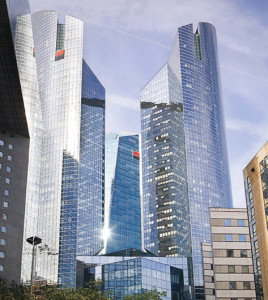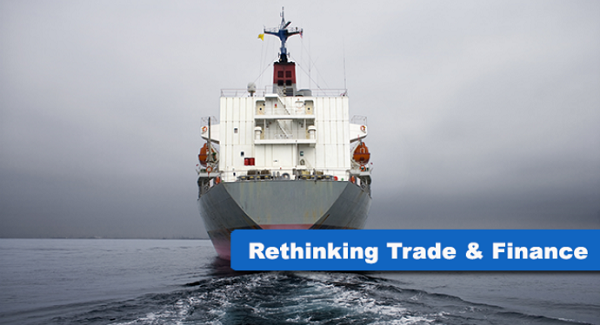
For the finance teams in major businesses and the banks that serve them, the SIBOS conference is a key moment in the calendar — a launch-pad for new thinking on payment, treasury systems, cash management and technology. What is debated there has a direct impact on top Gulf companies trading internationally. PAUL MELLY reports on the issues at the heart of this year’s debates to come in Boston, and how a leading global player, Société Générale, tackles today’s challenges.
International banks can’t properly cater for the financial needs of Middle Eastern companies without an appreciation of the region’s culture and business. That much is obvious.
But the obverse is equally true. Gulf companies and banks with international ambitions and an eye to their competitiveness beyond the regional market find themselves under pressure to keep up with new developments worldwide.
International trends are an inescapable influence – a reality to be highlighted at the 2014 edition of the SIBOS annual banking conference, which this year takes place in Boston, following last year’s Dubai event, a first foray into the Middle East.
Société Générale is among the world leaders in transaction banking, and the approaches that it adopts give an insight into trends across the industry and the expectations of the major international businesses that it serves.
And these are also pointers to the potential evolution of financial service demand among large enterprises in the Gulf and emerging markets more generally.
Pascal Augé, head of global transaction banking and payment services at Société Générale, is responsible for a diverse range of activity that ranges from trade finance to correspondent banking.
“I oversee half-a-dozen major areas of service,” he explains.
“Our cash management business has around 3,000 major clients, mostly large or mid-sized companies. We accompany European and US clients in their operations in emerging markets – and we support clients in emerging economies as they seek to become more international.”
Big international presence
Société Générale is also highly active in correspondent banking and cash clearing. Indeed, says Augé, it is one of the world’s top three banks in euro-clearing. But it is also keeping a low profile presence in the dollar clearing market and it has, more importantly, clearing capacities for the currencies of emerging countries where it has a substantial network presence and counts among the major local players, the four most important ones being the Czech Republic, Morocco, Russia and Romania.
Meanwhile, in the market for trade services (excluding commodities), the bank ranks seventh worldwide, says Augé. “And we have factoring houses in France and most emerging countries we operate in, including Russia, Morocco, Serbia and Cameroon.”
Foreign exchange is a joint venture between the business areas that Augé oversees and Société Générale Corporate & Investment banking.
“And last but not least, we provide a full range of payment services, including card payments,” Augé adds.
However, since the global financial crisis of 2008-10, major banks have had to take tough choices about what they do and where they do it. Société Générale was no exception.
What has resulted is a strategy based on catering for both developed and emerging economies – but in differing ways. And that has also translated into increased support for its resilient transaction banking activities.
Société Générale Transaction Banking has an operating presence in 55 countries, largely in Europe, Africa and Asia, but it also seeks to support a key axis of emerging market trade, even where it does not have a branch network.
New approach to the Gulf
“So we are starting to develop a new approach to the Gulf – a crucial business partner for south and east Asia. We do have a small office in Dubai, but now we are also basing a regional trade specialist in Singapore,” explains Augé.
“The job there will be to support our Asian clients in their dealings with the Middle East – and to support the major clients that we have in the Gulf as they trade with Asian markets and other parts of the world.”
New advances in technology have attracted a lot of attention recently. But Augé finds that major businesses in emerging economies such as the Gulf take for granted their banks’ ability to provide the most up-to-date banking systems and IT support for cash management and trade services.
“The first thing that they look for is the extent of the network that we can provide to accompany them as they do business around the world,” he says.
“By contrast, our European and US clients tend to take our geographical coverage for granted and to lay a heavy emphasis on technology and our capacity to offer them real-time electronic services and, for example, our ability to provide accounts on the same basis and formats in many different places.”
There has been some speculation about the appeal of cloud-based services, but Augé cautions that there is still a lot to be done on the basics first, such as internet banking.
“What we cannot compromise on is the safety of data and the reliability of systems. These are key issues for all clients, whether in emerging markets or developed economies.”
Moreover, it’s also vital to ensure that existing systems are well coordinated.
“There is still a challenge to be met in making sure that all our systems work well together in real time, so that we have effective ‘technical fluidity’ between the various countries where we are providing services,” explains Augé.
The same requirement for a coherent approach apply to compliance and internal disciplines.
“We have to ensure that all the different parts of our group comply with our rules and internal controls. That means setting targets, and different strategic layers of control, to ensure that throughout the group everyone properly applies our compliance principles.”
Strength through partnerships
Yet however far a global bank such as Société
Générale extends its own operations, it cannot cover every single economy to the same level of depth.
A bank, therefore, needs to be unafraid to collaborate with others in order to deliver the service that its clients need.
“We have to build up partnerships, even with our competitors, in those countries where we do not have a substantial presence. It makes sense for us to focus on where we have real strengths and to show a willingness to work with partners elsewhere,” says Augé.
“In south-east Asia we work with ANZ, and in the UAE we have a local agreement with National Bank of Abu Dhabi (NBAD). Banking is a people business – so we need to respect other banks, too, where that helps us to meet the needs of our client base.”
Looking ahead, Augé does not see geographical expansion as a major priority for Société Générale Transaction Banking, although he does not rule out the establishment of occasional new offshoots, where individual opportunities crop up.
But the real priorities for development lie in further strengthening the services and products that Société Générale offers.
“We want to strengthen cash management and our technical capacity further so they can be as integrated and fluid as possible, so that we can offer a service that is seamless across all markets but still takes account of local conditions and customer needs,” says Augé.
“We want to further reinforce our internal discipline in satisfying compliance principles and delivering our business lines in a coherent manner. And we need to further digitalise our technology, to improve its interaction with external systems such as the SWIFT international payments system.
“And these priorities – security, compliance and partnerships – are also the ones that we believe need to be at the heart of the agenda for this year’s SIBOS.” n
 Cash And Trade Magazine For Cash and Trade professionals in the Middle East
Cash And Trade Magazine For Cash and Trade professionals in the Middle East




